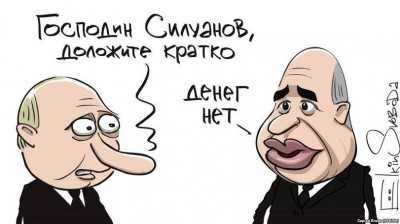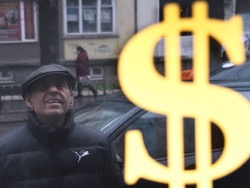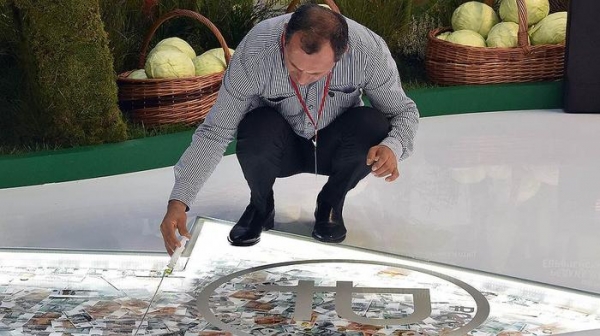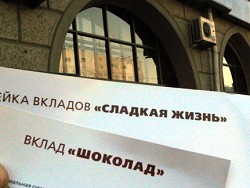
On the 25th of April, the Bank sharply reduced interest rates on deposits. Most went to Euro deposits. When investing for a period of one year, they have fallen almost to zero and now account for 0.01 to 0.1% per annum. The yield of deposits for the year decreased by 0,5%. A maximum yield of 0.65% per annum — achieved by investing 20 thousand Euro for three years.
Slightly less affected dollar deposits. To near zero decreased the yield only deposits up to 3 months. Longer rate of deposits reduced by 0.1−0.3% per annum. Maximum rate in dollars — 2% (from $ 20 thousand for a period of 3 years).
And, of course, “under the hand” were the deposits in the national currency. Rates of ruble deposits of the base line reduced to 0,4−1,05% depending on the investment period. The maximum rate — 7.3% of the investment from 700 thousand rubles for a period from one to two years.
The yield on ruble-denominated savings certificates worth up to 8 million reduced by 0.2% per annum for larger amounts — has not changed. The maximum income — 11,5% annual, the savings Bank promises to those who invested in the certificates for 1095 days no less than 100 million rubles.
Now, I suppose, the example of Sberbank will be followed by other credit institutions. From the beginning of April the terms of ruble deposits already worsened 40% of banks from the top thirty on the size of attracted funds of the population. It is Alfa Bank, Binbank, and MDM Bank, URALSIB, Raiffeisenbank, Gazprombank, Russian agricultural Bank, Moscow credit Bank, Renaissance credit, Russian standard Bank, Sovcombank, “trust”. The average yield of their deposits reduced by 0.2−0.6% per annum, and foreign currency rates have been reduced in about a third of these banks by 0.1−0.5% per annum. In such a situation the decision of the savings Bank can become a catalyst for the process of resetting rates
We can say that now Russia will live, like Europe. There is also Deposit rates almost zero. However, in some European countries, e.g. Denmark, interest rates on loans individuals and even negative. This means that borrowers pay the Bank for the use of money, and the Bank pays borrowers for a loan. However, we have to this “communism” thing is unlikely to happen.
The reason for the decision of the savings Bank is obvious — money in the Russian banking system too much. In February the Minister of economic development Alexei Ulyukayev said that the banks suffer from an excess of foreign currency liabilities, which have nowhere to go, since foreign currency loans nobody takes. The obvious method of recovery in such a situation — stop to increase these liabilities. This is what banks and engaged, reducing the attractiveness of deposits.
What effect will the zero rates on the Russian economy, as now people will be able to keep their savings?
— It is necessary to emphasize that the rates are reduced only for new deposits, — says the head of a direction “Finance and Economics” Institute of contemporary development Nikita Maslennikov. — On average, interest rates on ruble deposits reduced by 0.9% on a currency — by 0.5%. In the end, the average interest rate on deposits in dollars and Euro amounted to only 0.1%. This is a very sharp move down.
On the one hand, the reason for the zeroing of foreign currency deposits is clear: the demand for such deposits is falling, and even the former small deposits in dollars and euros population to actively convert into rubles, and spends on current consumption.
But the main reason for the decision of Sberbank in the banking sector there is a smooth transition from a liquidity deficit to structural surplus. This means that banks have accumulated too much free money that don’t get used. In these conditions, to buy from the population to expensive liabilities — means to multiply the Bank’s own risks.
The costs of these liabilities the banks have nothing to “discourage”: demand for loans, the economy does not show. So, at the end of the first quarter of 2016, the banking sector showed negative values in all major indicators: 2.3% reduction in Bank assets, almost 3% — corporate loans by 1% — consumer, 3% — deposits of the population.
There is a paradox: the economic development Ministry says that a little more, and we see clear signs of recovery, but the economy shows no desire to borrow. This is despite the fact that interest rates on loans in the last year and a half has been steadily declining. Banks, being in this situation, I just can’t not to react to it.
Another clear indicator of a structural surplus is that banks have sharply reduced borrowing from the Bank of Russia. If we compare the figures of the end of 2015 and the first quarter of 2016, the volume of attracted funds, the regulator decreased 2.4 times (from 12 trillion. rubles to 5 trillion.)
If such situation occurs when money to banks is not needed — this is inevitably reflected in the Deposit market.
“SP”: — Why is there a surplus?
— Due to budget issue. To Finance the budget deficit, the Russian economy gets the money not through the channels of the Bank of Russia and Ministry of Finance channels. Roughly speaking, the Ministry of Finance, the Central Bank sells Reserve Fund, denominated in the currency, and the Bank of Russia is forced to accompany the purchase of a technical issue. As a result, in the last two months, the money supply is only growing.
This, incidentally, means one thing: until we have a budget deficit — and most importantly, continue until the uncertainty with the size of the deficit and sources of its coverage, banks will remain hostages of the situation. And will adapt to it as they can.
“SP”: — Other banks will follow the example of Sberbank?
— Most of the leading banks have issued press releases, which essentially boils down to one thing: we have not yet gone in the direction of the sharp decline in interest rates, but are closely monitoring the trends and don’t rule anything out. In fact, it is a warning that banks — or otherwise — will follow the market leader, Sberbank.
“SP”: — what now for the citizens to keep their savings?
— Banks, in order not to lose customers in the near future will begin offering so-called Deposit-investment products.
Bankers is profitable — this way they get long-term money: the minimum maturity period of such products is one year, and the average is about three years. The population is, oddly enough, too, will benefit. Now begins to form a trend: the longer the maturity of an investment product, the higher the customer the probability to obtain a decent rate of return, significantly higher than inflation, and returns on deposits (at the track from three years and above).
In the first quarter of 2016 good yield showed mutual funds (mutual Funds). Very wealthy customers — at least, the upper middle class is already beginning to shift focus from deposits to investments in mutual Funds. Gradually grows and the market of trust management, in addition, in 2016 interested in the prospects of the corporate bond market.
Another tool for the population can be individual investment accounts. While such accounts opened in Russia not so much — about 100 thousand, and a third of them in the savings Bank. While the maximum you can place on this account is 400 thousand rubles, then in three years you receive a bonus an average of 52, thousands of. Now the bankers propose to raise the upper limit to 1 million rubles. Most likely, this year it will be done, and then the segment of individual investment accounts will grow significantly.
In addition, the Central Bank and the Finance Ministry promised already in the first half of the year to propose legislative amendments under which citizens will be able to access banks in individual retirement accounts. In fact, this type of asset management is only at the Bank level. Still, banks, especially the state, citizens tend to trust more than the “normal” Manager.
All these products belong to the Deposit, investment, and the bankers now are set up to maximize the line of such products.
As for short contributions, there has been a curious trend. Banks now offer so-called “seasonal” deposits, which within two or the first three months of accrued interest above the market. However, in the end, the client still receives the minimum increment of money, however, people on these proposals is underway.
In fact, you should pay attention to deposits with a yield of not less than 7-7,5% per annum by investing up to one year, and not less than 6-6,5% for a period of over a year. Yes, the big win you will not receive, but, at least, protect savings from inflation.
“SP”: — what impact the reset rates on the Russian economy?
— Everything that happened — a consequence of the necessary adaptation of the banking sector to the current state of the economy. Therefore, the trajectory of overcoming the recession, the zero rates are not affected.
But for the banking sector this will mean increased competition. If at the end of this adaptation, the banks will become stronger and more effective if you can decide what is important for the economy the problem of transformation of savings into investment, the economy will benefit. Such a transformation will be able to push up and the financial market, and investment lending…
— I don’t think that zero interest rates on deposits will greatly affect the economy, — said the Chairman of Russian economic society them. SF Sharapova, Professor of international Finance MGIMO Valentin Katasonov. — Sberbank is trying to do what’s long been the practice of banks in the West. There are some lenders, as they say in the circle of economists, even “went under water” — has cut interest rates below zero. But the growth of the Russian economy, I think, even in this case will not happen.
One may argue that cheap automatically reduces deposits and loans. But in the current Russian economy credits — which are, indeed, cheaper, is still not going to the development of production in the real economy, and puts the speculative financial market.








